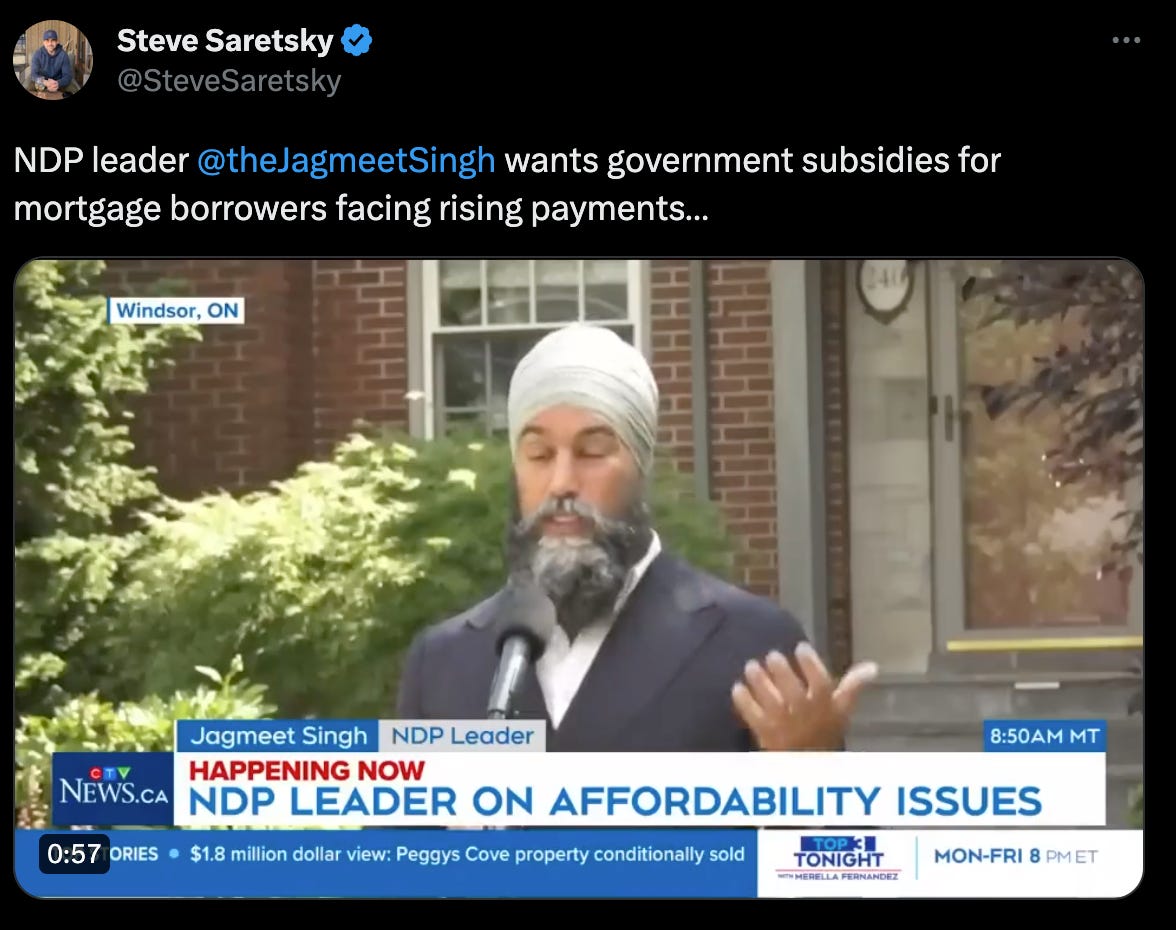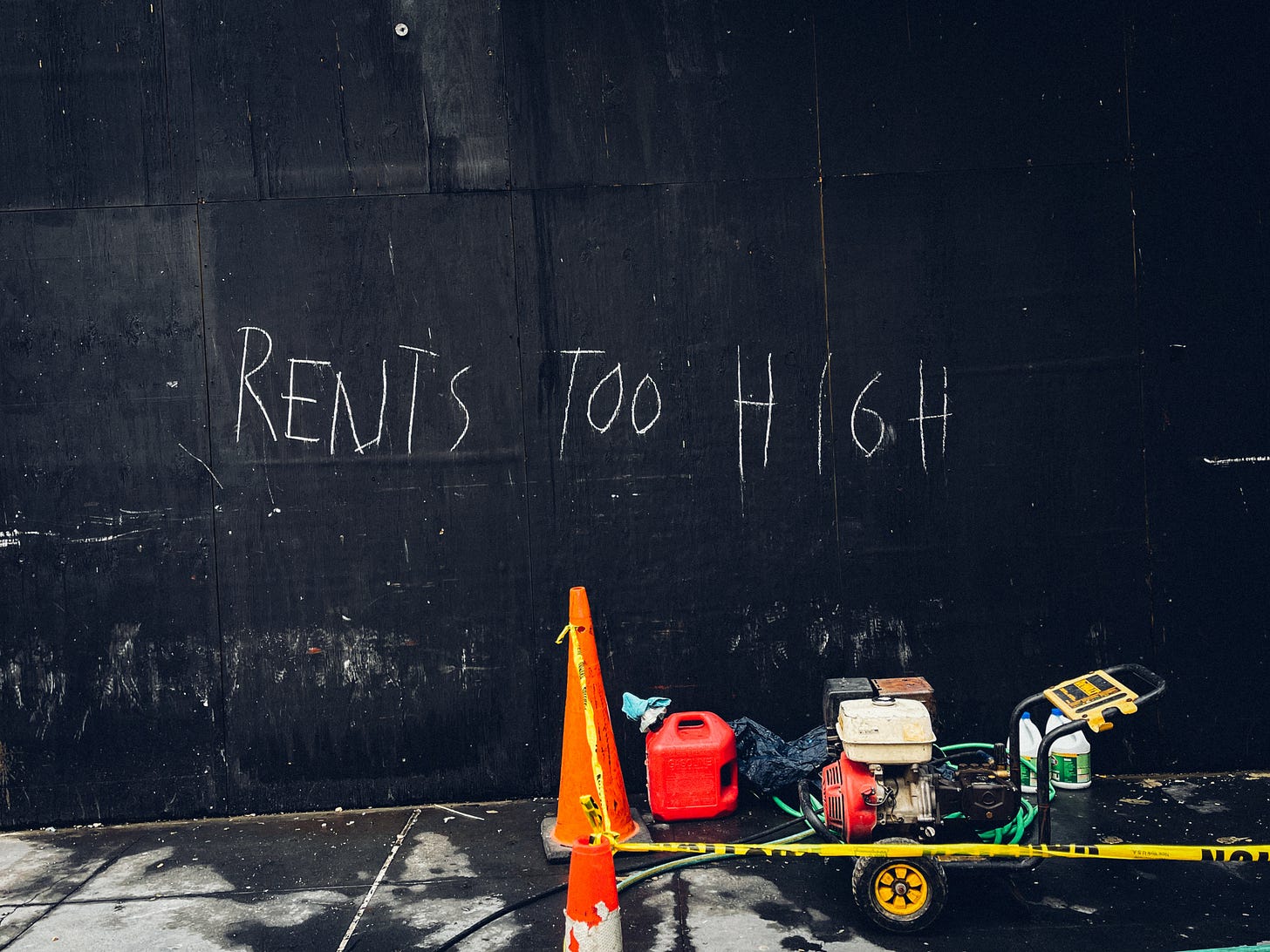I was taking in the news this week and came across several different pieces lamenting the state of housing in Ontario. Now, this is nothing new, we’ve been watching this crisis unfold over the last couple years with no end in sight. However, with the most recent BoC interest rate hike it seems that more and more home owners are entering into a conversation that was previously dominated by renters and those looking/hoping to buy. And with the addition of this growing collection of voices representing mortgage owners struggling with the rapidly rising interest rates, its not always being well received.
Perhaps the best example of this was seen in NDP leader Jagmeet Singh’s floating the idea of mortgage subsidies or forcing banks to lower interest rates for struggling families. The comments were met with pushback from both sides of the political spectrum, both using it as way of showing how out of touch politicians are from hardworking Canadians. However, I don’t want to focus on that predictable, and highly hypocritical, partisan noise. No, what stood out to me most was the way this whole thing seemed to pour gas on the flames of an already simmering divide — the gap between renters and homeowners.
Many of Singh’s base felt — justifiably — alienated by comments that seemed to prioritize the felt needs of this emerging category of homeowners struggling under interest rate hikes while the rental market has gone largely unchecked and unaddressed for years.1 For renters, the housing boom at the early part of the pandemic created a surge in rennovictions and landlords looking to capitalize on a hot market. It took an already tenuous situation and made it even worse. There’s probably even a case to be made that many of the new homeowners who are currently staring down these interest rate hikes on their already high mortgage payments may have been renters who bought in part because the rental market was so punishing during that time. The tension though lies in the fact that ownership, even in hard times such as this, still affords a degree of privilege and stability that renters simply don’t have. It’s a gap of privilege that Michelle Cyca recently referred to in her brilliant article in Macleans that looks at the causes of the housing crisis. In it she notes,
These clashes will be drawn in large part along generational lines, as younger Canadians find themselves left out of the homeownership bonanza of the past two decades. And as the gap between housing haves and have-nots grows, the pressure will move downward to crush those already most vulnerable.
This is why hearing a national party leader talk about offering further protections for homeowners while renters continue to scream into the void seems to be drawing this gap into the spotlight. However, I still think we’re looking at the wrong thing.
We are in a housing crisis that is having a significant negative impact upon the lives of many, many people. Of course the impact of it is not equal, some groups are overburdened and will suffer more consequences if/when things collapse for them. Certain other groups have done a poor job of listening to these problems and are only now entering the conversation because its finally hitting them. But the system gets away with perpetuating (and benefitting off of) this crisis by keeping us divided against one another.
In his book, Blueprint for Revolution, Srdja Popovic talks about how the central question in movement building is how to get people from different backgrounds and who want different things to work together. His answer lies in creating, what he refers to as, a shared vision of tomorrow. The goal is to get as many allies onto your side as possible and in order to do that you need to share a vision with them that connects to their needs. You have to frame the issue in a way that resonates with the most amount of people.
More people waking up to a crisis is an opportunity for this sort of shared vision. It’s a chance for us to refine our solution to create the best possible outcome for as many people as possible. Solidarity is not about everyone agreeing with one another or having no differences; its about working together despite our differences because we want a better future for everyone.
In my last post for the Whale I shared a bit about how moments of societal anger become an opportunity to onboard people into the movement. One of the best ways to do that is to seek a solution that aligns your struggles. Work with them to create a shared vision of tomorrow that they can see themselves in.
This is the value of coalition building. It’s a way of gathering disparate groups with all sorts of great ideas under one umbrella of sorts so that they can work towards a shared goal. It can bring alignment and a clear narrative to the vision. It can turn many smaller conflicting causes into a larger, single movement. We need this. We need established coalitions like SCGC that are already out there, doing the hard work of forging relationships across causes and interest groups to make that network of allies as big as possible. We need it to keep growing.
That’s the path to real solidarity.
Thanks for reading to the end,
Weekly News Digest - “The Blowhole”
Here are some emerging stories and events that we think will have an impact on our region that we’re keeping our eye on.
The End of Homeownership. I mentioned this in my post, but if you haven’t read this Macleans article from Michelle Cyca please do.
Bradford Library workers have gone on strike. Speaking of solidarity, library workers are great and deserve our support. As we talk about rising costs of living and housing affordability, making sure workers in public spaces like this are getting paid a living wage is an important struggle.
Join the Pod
Like what we talk about and want to engage with our coalition more? Check us out on social media or drop us a line if you’d like to volunteer: info@simcoecountygreenbelt.ca
I call it the ‘Wild West'. While on paper, protections exist, there are very little rules actually regulating it in practice.









Very thoughtful. It's so easy to only see the crisis from our personal perspective (e.g. I have a home now) and to forget about how difficult it is to live in constant fear of renoviction, or of losing your home for financial reasons, or of never being able to afford your own space. I rented for many, many years and often felt like "a second class citizen." It's hard to have the energy or vision for a better future when you live in fear of ending up on someone's couch.
Great post!